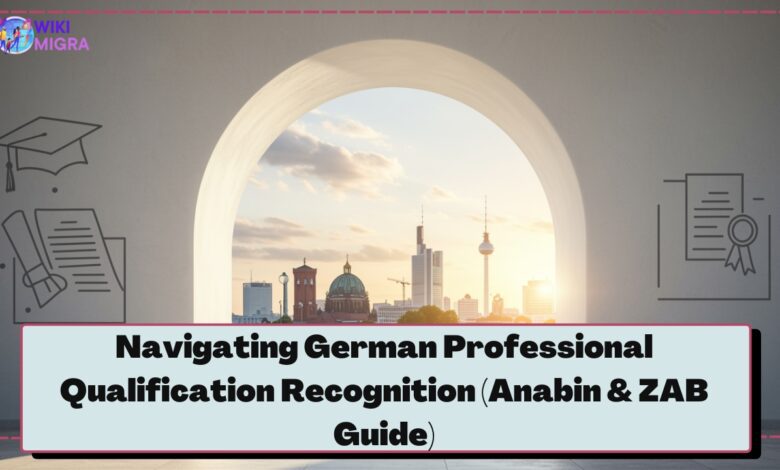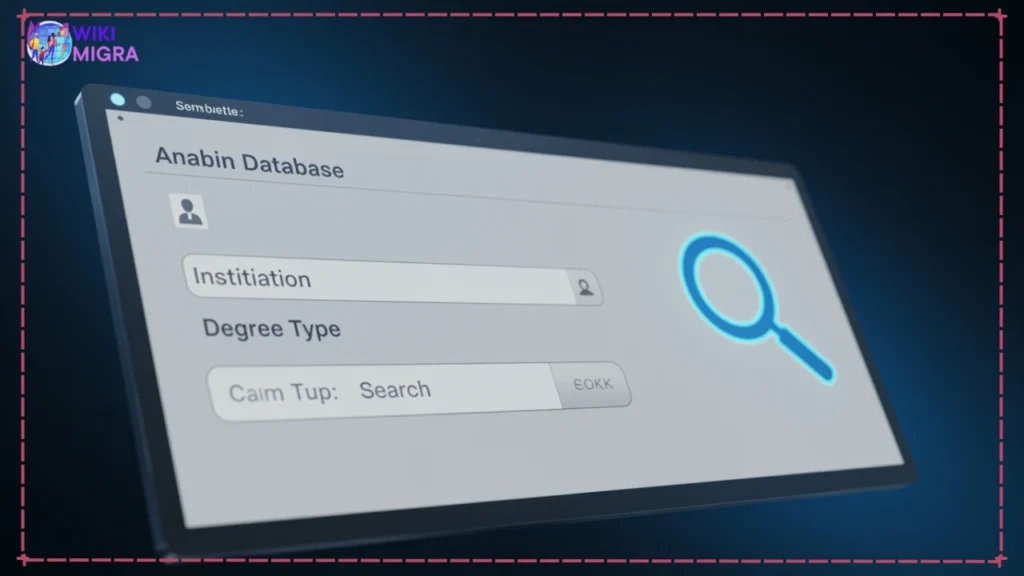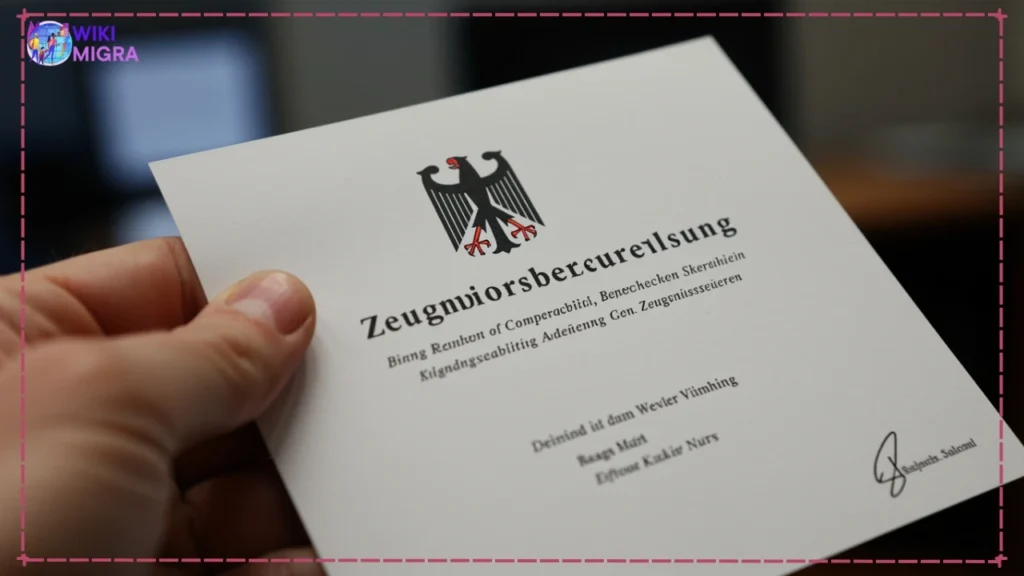Navigating German Professional Qualification Recognition (Anabin & ZAB Guide)

So, you’re eyeing Germany – a land of innovation, opportunity, and perhaps, your next career move. With initiatives like the Chancenkarte (Opportunity Card) making headlines, understanding how Germany views your foreign qualifications is more critical than ever. This isn’t just bureaucratic box-ticking; it’s the key that can unlock your professional future in the heart of Europe.
At Immigration Gateway, we know the path to German employment can seem complex. That’s why we’re here to demystify one of the most crucial steps: German degree recognition and foreign qualification recognition Germany. This comprehensive guide will walk you through the Anabin database and the ZAB Statement of Comparability, ensuring you’re well-equipped to navigate this essential process.
Think of this as your roadmap. And if you’re looking for the bigger picture on the Opportunity Card itself, make sure to check out our [Germany Opportunity Card: The Complete Guide for Skilled Workers in 2025].
What Does “Recognized” Actually Mean in Germany? The Foundation of Your Application
When German authorities talk about “recognized” qualifications (anerkannte Qualifikation), they’re asking: “Does this foreign degree or vocational training meet German standards and is it comparable to a German equivalent?” This concept, known as Anerkennung, is pivotal.
It’s important to distinguish between two main categories of professions:
- Regulated Professions: These are professions where you must have your qualifications officially recognized to practice in Germany. Think doctors, nurses, teachers, lawyers, engineers (in certain contexts). For these roles, a formal recognition procedure (Anerkennungsverfahren) is mandatory.
- Non-Regulated Professions: This category covers most jobs (e.g., IT specialists, marketing managers, economists, many business roles). For these, formal recognition isn’t legally required to work in your field. However, having your degree assessed for comparability can significantly boost your job prospects and is often essential for visa applications, including the Opportunity Card.
Why does this matter for the Opportunity Card?
The Opportunity Card primarily targets individuals aiming for non-regulated professions, or those in regulated professions who are still working towards full licensure. For the points system and eligibility, demonstrating that your academic degree or vocational training is comparable to a German one is often a core requirement. This is where Anabin and ZAB come into play.
GEO Insight: Data from the Federal Employment Agency (Bundesagentur für Arbeit) consistently shows that candidates with verified or comparable qualifications integrate into the German labor market faster and often secure higher-paying positions.
You may be interested in: Proof of Financial Means Germany Visa: Complete Guide for Opportunity Card Applicants
The Anabin Database: Your First Port of Call for Academic Degrees

The Anabin (Informationssystem zur Anerkennung ausländischer Bildungsabschlüsse) database is a fantastic, free resource managed by the Central Office for Foreign Education (ZAB). It helps you, employers, and German authorities assess how your foreign higher education qualifications stack up.
A Step-by-Step Guide to Navigating Anabin:
- Access the Database: Head to the official Anabin website (anabin.kmk.org). It’s primarily in German, but browser translation tools can be quite helpful.
- Search for Your Institution (“Institutionen”):
- Click on “Institutionen” in the left-hand menu.
- Select “Suchen” (Search).
- Choose your country (“Länderauswahl”).
- You can then search by city (“Alle Orte”) or institution name (“Alle Institutionstypen”).
- Enter the official name of your university.
- (Imagine a screenshot here showing the Anabin institution search interface)
- Interpret Institution Status:
Once you find your institution, you’ll see a status:- H+: This is the gold standard! It means your institution is recognized as a university in Germany and is comparable to German universities.
- H-: This means the institution is not recognized or accredited as a university in its home country according to German standards. Degrees from H- institutions are generally not considered comparable.
- H+/-: This status indicates that the institution might have some programs that are considered university-level and others that are not. This requires a closer look at your specific degree type.
- Search for Your Degree Type (“Hochschulabschlüsse”):
- If your institution is H+, the next step is to check your specific degree.
- Go back to the Anabin main menu and select “Hochschulabschlüsse.”
- Search by country and then look for your specific degree title (e.g., “Bachelor of Science in Computer Science”).
- (Imagine a screenshot here showing the Anabin degree type search results with classification)
- Interpret Degree Comparability:
Anabin classifies degrees based on their equivalence to German qualifications:- “entspricht” (corresponds to): Your degree is considered equivalent to a specific German degree.
- “gleichwertig” (equivalent): Similar to “entspricht,” indicating direct comparability.
- “bedingt vergleichbar” (conditionally comparable): There might be some differences, or it might lead to a lower-level German equivalent.
- If your specific degree is listed and your institution is H+, this Anabin printout is often sufficient for visa applications like the Opportunity Card, especially for non-regulated professions.
Example Scenario:
- Maria has a “Bachelor of Engineering” from “XYZ University” in India.
- She searches Anabin:
- “XYZ University” has an H+ status. Great!
- She then searches for “Bachelor of Engineering” from India. She finds her specific degree program listed, and it’s classified as “entspricht einem deutschen Bachelor” (corresponds to a German Bachelor).
- Maria can print these Anabin pages as proof of comparability.
Important Tip: Always print out both the institution’s H+ status page and the page for your specific degree type if it’s listed. These printouts serve as your initial evidence.
The ZAB Statement of Comparability: When Anabin Isn’t Enough

What if your institution is H+ but your specific degree isn’t listed in Anabin? Or what if you have vocational training? This is where the ZAB (Zentralstelle für ausländisches Bildungswesen) Statement of Comparability (Zeugnisbewertung) becomes essential.
The Statement of Comparability is an official document issued by the ZAB that describes your foreign higher education qualification and certifies its comparable level to a German qualification. It’s a detailed assessment specifically for your individual degree.
When is a ZAB Statement of Comparability Needed?
- Your university is H+ in Anabin, but your specific degree program is not listed.
- Your university has an H+/- status, requiring individual assessment.
- You are applying for roles or visas (like the EU Blue Card) that explicitly require it.
- For certain vocational qualifications where an Anabin entry isn’t applicable (though vocational training has its own recognition bodies, ZAB can sometimes assess higher-level vocational degrees).
- You simply want a definitive, official document from a German authority for your job search, even if not strictly required for the visa.
Application Process for a ZAB Statement of Comparability:
- Check Eligibility: ZAB primarily assesses completed higher education degrees that are equivalent to at least a Bachelor’s level in Germany.
- Online Application: Visit the ZAB section on the KMK website (www.kmk.org/zab/statement-of-comparability.html). You’ll need to fill out an online application form.
- Gather Required Documents: This is the most crucial part. The list is extensive and must be followed precisely.
Document Category | Specifics | Notes |
Application Form | Signed printout of your online application. | |
Identity Document | Copy of your passport or national ID card. | |
Degree Certificate | Official copy of your original degree certificate (e.g., Bachelor’s, Master’s). | In original language AND sworn translation if not in German/English. |
Transcript of Records | Official copy of your academic transcript/mark sheets for all years of study. | In original language AND sworn translation if not in German/English. |
Diploma Supplement | If issued by your university. | |
Secondary School Certificate | Copy of your high school leaving certificate (e.g., A-Levels, Baccalaureate, High School Diploma). | Entitling you to higher education in your home country. |
Previous Degrees (if any) | If applying for Master’s comparability, include Bachelor’s documents. | |
Proof of Name Change | If your name differs on documents. | e.g., marriage certificate. |
Specific Country Docs | ZAB has specific requirements for certain countries (check their website!). | For example, APS certificate for China, India, Vietnam. |
- Note on Translations & Notarizations: Generally, documents not in German or English require sworn translations. ZAB usually requires certified copies of your original documents, not the originals themselves (unless specified). Always check the latest ZAB guidelines for your country!
Personalized Recommendation: If you’re from a country with very high application volumes (e.g., India, Pakistan, MENA region), anticipate potentially longer processing times for ZAB. Start gathering your documents even before you have a concrete job offer if you know you’ll need this statement.
You may be interested in: In-Depth: Germany Opportunity Card Points System Calculator & Detailed Breakdown
Vocational Training Recognition: A Different Path, Equally Important

Germany highly values vocational training (Berufsausbildung). If your pathway to the Opportunity Card relies on your vocational qualifications, the recognition process differs from academic degrees.
Key Differences from University Degree Recognition:
- No Central Database like Anabin: While Anabin touches on some academic-level vocational degrees, most vocational qualifications are assessed by specific competent bodies.
- Focus on Practical Equivalence: The assessment checks if your foreign vocational training (content, duration, practical skills) is equivalent to a German apprenticeship in a similar field.
- Relevant Authorities:
- For crafts and skilled trades (Handwerksberufe): The local Chamber of Crafts (HWK – Handwerkskammer) is usually responsible. You can find the relevant HWK via the HWK Finder.
- For industrial, commercial, and technical professions (Industrie- und Handelsberufe): The IHK FOSA (Foreign Skills Approval) is the central body for assessing qualifications for Chambers of Industry and Commerce (IHK).
- For other regulated vocational professions (e.g., healthcare): Specific state-level authorities are responsible. The “Anerkennung in Deutschland” portal is your best resource here.
Importance for the Opportunity Card:
The Opportunity Card requires either a recognized university degree OR at least two years of vocational training that is recognized by the country where it was obtained and, ideally, considered comparable or partially recognized in Germany. Full recognition of vocational training can award significant points.
- Official Resource: The portal “Anerkennung in Deutschland” (Recognition in Germany) (www.anerkennung-in-deutschland.de) is invaluable. It offers a “Recognition Finder” tool to help you identify the correct authority for your specific vocational qualification.
What if My Qualification is Only “Partially Recognized”? (The Points Connection)
Sometimes, your foreign qualification might not be deemed fully equivalent to a German one, but rather “partially recognized” (teilweise Gleichwertigkeit). This isn’t necessarily a deal-breaker, especially for the Opportunity Card!
- For Non-Regulated Professions: Partial recognition can still be very valuable. It demonstrates a certain level of skill and can contribute to your points tally for the Opportunity Card. It might also highlight specific areas where you might need further training or adaptation measures (Anpassungsqualifizierung) to achieve full equivalence later, should you wish.
- For Regulated Professions: Partial recognition usually means you cannot practice the profession directly. You’ll typically need to undergo “compensation measures” (like an adaptation period or an aptitude test) to achieve full recognition.
If your ZAB Statement or vocational assessment results in partial recognition, carefully read the assessment. It will often outline the differences and sometimes suggest pathways to full recognition.
You may be interested in: German Language Levels for Visas: A1 vs. B2 for the Opportunity Card Explained
How to Check if Your Qualification is Recognised in Germany?
o check if your qualification is recognised in Germany:
- Use the Anabin Database: Visit the Anabin database to verify whether your university and degree are recognised. Look for:
- H+ Status: Indicates that your university is recognised.
- Degree Classification: Ensure your degree title matches exactly with what is listed in Anabin. Look for classifications like “Gleichwertig” (equivalent) or “Entspricht” (comparable).
- Recognition Finder Tool: Use the Recognition Finder on the “Anerkennung in Deutschland” portal to identify the responsible authority for recognising your specific qualification.
- Statement of Comparability: If your qualification or institution is not listed in Anabin, apply for a Statement of Comparability from the Central Office for Foreign Education (ZAB). This document evaluates how your foreign qualification compares to German standards.
- Seek Advice: Contact counselling centres such as IQ Netzwerk or use the helpline “Working and Living in Germany” (+49 30 18151111) for guidance on recognition procedures.
Can I work in Germany with a foreign degree?
Yes, you can work in Germany with a foreign degree if it is officially recognized or deemed comparable to a German degree. For non-regulated professions, recognition is not mandatory but may be required for visa purposes (e.g., EU Blue Card). You can check the comparability of your degree and university using the anabin database. If your degree or university is not listed or recognized, you can apply for an individual evaluation through the Central Office for Foreign Education (ZAB). For regulated professions (e.g., doctors, lawyers), recognition is obligatory before employment.
What is the ZAB assessment in Germany?
The ZAB (Central Office for Foreign Education) assessment in Germany evaluates foreign academic and professional qualifications to determine their equivalence to German standards. It issues a Statement of Comparability, which is an official document confirming how a foreign degree corresponds to a German qualification. This assessment is essential for visa applications, EU Blue Card eligibility, job applications, or working in regulated professions in Germany.
How do I know if my qualification is partially recognised in Germany?
To determine whether your foreign qualification is partially recognised in Germany, you must go through the recognition procedure. This process involves a detailed comparison of your foreign qualification with its German equivalent. Below is a step-by-step explanation of how this works and how you can identify if your qualification is partially recognised.
Step 1: Understanding the Recognition Procedure
The recognition procedure, also known as the “equivalence assessment” (Gleichwertigkeitsprüfung), evaluates whether your foreign professional or vocational qualification matches the standards of a comparable German qualification. The competent authority in Germany will assess your documents, including certificates and training records, to determine equivalence.
If substantial differences are found between your foreign qualification and the German reference occupation, partial recognition may be granted. This means that while some aspects of your training meet German standards, others do not and require additional measures to achieve full recognition.
Step 2: Receiving an Official Notice
Once the competent authority completes its evaluation, you will receive an official notice called an Anerkennungsbescheid (recognition notice). This document outlines the results of the recognition procedure:
- If your qualification is fully equivalent to the German standard, it will be fully recognised.
- If substantial differences exist but parts of your training are deemed equivalent, you will receive partial recognition.
The Anerkennungsbescheid for partial recognition will specifically list:
- The areas where equivalence has been established.
- The substantial differences compared to the German reference occupation.
- Recommendations for compensatory measures or further training required to achieve full recognition.
Step 3: Identifying Partial Recognition for Non-Regulated Professions
For non-regulated professions, partial recognition allows you to work in your field even if full equivalence has not yet been achieved. However, completing additional qualifications or refresher training (as outlined in the notice) can improve job prospects and lead to full recognition later on.
Step 4: Identifying Partial Recognition for Regulated Professions
For regulated professions (e.g., doctors, nurses, teachers), partial recognition alone does not grant permission to practice in Germany. In such cases:
- The Anerkennungsbescheid will specify compensatory measures such as adaptation courses, internships (Anpassungslehrgang), or proficiency exams (Kenntnisprüfung).
- Once these measures are successfully completed, you can apply again for full recognition.
Step 5: Seeking Guidance and Support
To ensure clarity about whether your qualification is partially recognised:
- Use tools like the Recognition Finder on portals such as Anerkennung-in-Deutschland to identify the responsible authority for your profession.
- Consult counselling services like IQ Netzwerk or ZSBA (Central Service Centre for Professional Recognition) for guidance on interpreting your Anerkennungsbescheid and planning next steps.
Summary of Key Indicators for Partial Recognition
Your qualification is partially recognised if:
- You receive an official Anerkennungsbescheid stating that parts of your training meet German standards but substantial differences remain.
- The notice includes recommendations for compensatory measures or further qualifications needed to achieve full equivalence.
- For non-regulated professions, you may still work with partial recognition; however, completing additional requirements improves career opportunities.
- For regulated professions, partial recognition requires completion of specified compensatory measures before obtaining a license to practice.
FAQ: Your Qualification Recognition Questions Answered

We get a lot of questions at Immigration Gateway. Here are some common ones specific to qualification recognition:
- Q1: “My university is H+ in Anabin, but my exact degree program isn’t listed. What do I do?”
- A: This is a classic scenario where you’ll likely need a ZAB Statement of Comparability. The H+ status for your university is a good start, but the ZAB will then individually assess your specific curriculum and degree to determine its German equivalent.
- Q2: “How long is a ZAB Statement of Comparability valid?”
- A: Generally, a ZAB Statement of Comparability does not have an expiry date, as it assesses a completed qualification against the German education system at the time of issuance. However, if the German education system or the qualification itself undergoes significant reforms, its relevance might be reassessed in specific contexts in the distant future, though this is rare.
- Q3: “Do I absolutely need all my documents translated and notarized/certified?”
- A: For the ZAB and most formal recognition procedures: Yes, usually. Documents not in German (and often English) typically require sworn translations. Copies of original documents usually need to be officially certified (beglaubigte Kopien). Always check the specific requirements of the authority you’re applying to (ZAB, IHK FOSA, etc.) for your country, as these can vary slightly. Cutting corners here will only lead to delays.
- Q4: “What if my vocational training is less than two years but very intensive?”
- A: For the Opportunity Card, the “minimum two years of vocational training” is a common benchmark. However, German authorities assess the overall equivalence. If your training was shorter but recognized as a full qualification in your home country and is demonstrably intensive and comparable to a German standard, it might be considered. This would be assessed on a case-by-case basis by the relevant vocational recognition body. It’s best to get an official assessment.
- Q5: “Can I start the recognition process while I’m still in my home country?”
- A: Absolutely! In fact, it’s highly recommended. The recognition process, especially for ZAB or vocational qualifications, can take several months. Starting early means you’ll have the necessary documents ready when you find a job opportunity or apply for the Opportunity Card.
Conclusion: Start Early, Secure Your Future
Navigating the German qualification recognition landscape might seem daunting at first, but understanding the roles of Anabin Germany and the ZAB statement of comparability (or the relevant vocational bodies) is your first major step towards a successful career in Germany.
The single most important piece of advice we can offer is to start this process EARLY. Gathering documents, getting translations and certifications, and waiting for processing times all add up. By being proactive, you significantly reduce stress and increase your chances of smoothly transitioning into the German job market.
This recognition is not just a formality; it’s an investment in your future, a validation of your hard-earned skills, and a critical component for visa applications like the Opportunity Card.
Ready to see if you meet the other criteria for the German Opportunity Card? Head over to our [Opportunity Card Eligibility Checker (Link to Pillar Page Eligibility Section – placeholder)] to learn more.
The path to Germany is paved with preparation. We at Immigration Gateway are here to help you lay those stones. Viel Erfolg (Good luck)!
Official Resources
- Anabin Database: https://anabin.kmk.org
- ZAB Statement of Comparability: https://www.kmk.org/zab/statement-of-comparability.html
- Recognition in Germany Portal: https://www.anerkennung-in-deutschland.de/html/en/
- Make it in Germany (Official Government Portal): https://www.make-it-in-germany.com/en/
- IHK FOSA: https://www.ihk-fosa.de/en/





